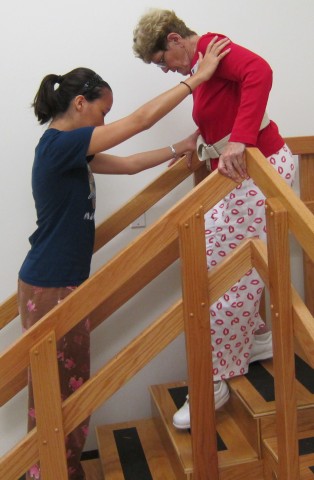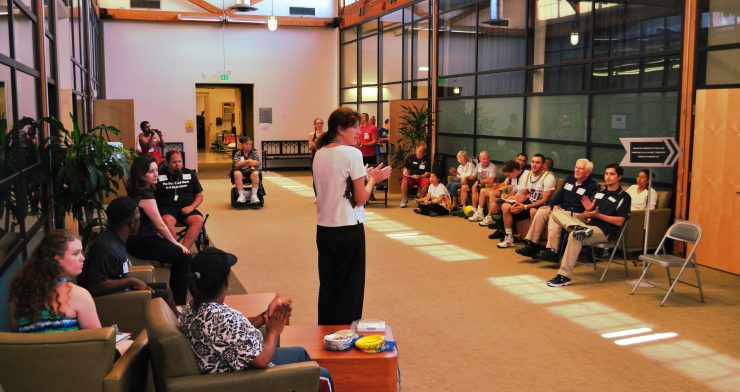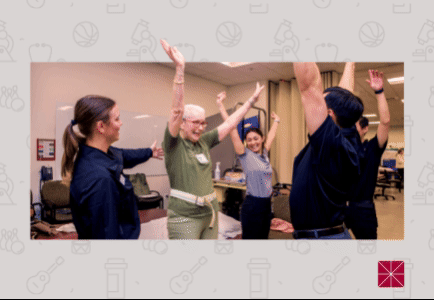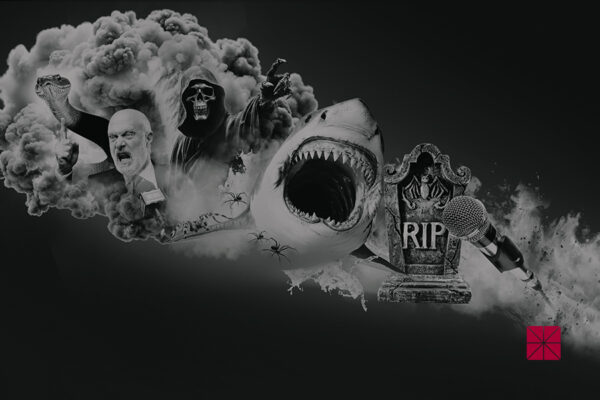Chapman’s innovative boot camp helps stroke survivors take steps toward recovery.
Stroke survivor Tom Birkenhead has big plans. The former college professor wants to build strength and endurance in his legs, increasing his independence getting in and out of his battery-powered chair. So there’s no room for sloppiness.
“That was kind of a sloppy sit,” Alison McKenzie, Ph.D., professor in the Department of Physical Therapy in the Crean School of Health and Life Science, tells Birkenhead after he executes a sideways drop into his chair. “And I want you to not hold on to your chair when you sit down.”
“Really?” says Birkenhead, his brown eyes widening in surprise. But his uncertainty is brief and he takes a deep breath. With a groaning effort he rises from his chair and completes a fairly smooth return to a seated position. McKenzie smiles and applauds. There’s more, though. She calls out “Drum roll!” and makes him rise for a 10th time, stand for several seconds, and lower himself into the chair.
Sweat dots his brow as Birkenhead mutters “Whoa.” But he is pleased.
“Thank you. Thank you,” he says to McKenzie.
Such small steps were like leaps for the 24 stroke survivors who attended Chapman University’s Stroke Boot Camp this summer. Now in its third year, the camp gives students in the Crean School’s Doctor of Physical Therapy Program a dose of clinical experience and provides stroke survivors intensive rehabilitation overseen by professional therapists. Chapman’s first-year DPT students arrange their summers around the two week camp, which serves as a head start before they begin clinical coursework in the community.

Stroke patient Jeanne Schabarum tackles stairs with help from a physical therapy student.
“It’s as much a boot camp for us as for the patients,” says Sam Swabb ’14, a Chapman DPT student. “We’re getting a lot of one-on-one experience. They throw us into the mix and challenge us.”
And it’s not for whimsy that it’s called Boot Camp. While the greatest gains in recovery are made in the first six months after a stroke, research shows that more advances can be gained with hard work, McKenzie says. It’s a costly benefit increasingly trimmed by insurers, but there’s reason to push for more rehabilitation programs. Of the more than 700,000 people who suffer a stroke in the United States each year, about two-thirds will survive and need therapy, according to the National Institutes of Health.
During the program at Chapman, each patient is evaluated and receives customized therapy led by McKenzie’s students, as well as one-on-one work with several professional therapists who volunteer at the camp. For Los Angeles resident Janet Johnson, who suffered a stroke in 2009, progress means relearning how to climb a short ladder.
“Fear is the number one thing for a person who’s had a stroke. But they take your fear away and build your confidence back,” says Johnson, who has returned to work as a pipe fitter.
Johnson is one of the camp’s high-functioning attendees. Others just hope to regain some mobility. Still, such gains are significant, McKenzie says.
“If I can’t walk anywhere, then I can’t hold a job,” she says. “I can’t be the spouse I used to be, I can’t be a volunteer in my church and all those roles we play in society.”
Indeed, Birkenhead says he knows he will have to continue the work long after the camp ends. But he’s already looking forward to an immediate benefit.
“I am homebound a lot because I don’t think of things to do,” he says. “But this is great now. I’m making some nice friends here. We might go to a movie.”
McKenzie smiles. It’s one more step in a good direction.
>> READ MORE: Happenings
>> READ MORE:
Chapman’s Stroke Boot Camp was the subject of a page one feature in The Los Angeles Times on Tuesday, Aug. 13. The
online version
includes additional photos.





Add comment